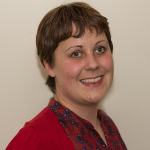
Dr Kate Granger is an acting consultant in medicine for older people working at Pinderfields hospital in Yorkshire, and also blogs and writes about her own experiences as a cancer patient
Hello, my name is Dr Kate Granger. I’m an acting consultant in medicine for older people working at Pinderfields hospital in Yorkshire. I’m also a terminally ill cancer patient diagnosed with a rare sarcoma just over three years ago.
I have been a keen observer of my healthcare throughout this difficult journey and it was apparent to me early on just how much the little things mattered to my experience as a patient. When somebody smiled, sat, or crouched down instead of towering over me, gave that extra moment to allow me to express my fears, or took the time to introduce themselves in a welcoming manner, it meant a huge amount and made me feel human again.
The #hellomynameis campaign was born out of a hospital experience I had when I was admitted to a urology ward with a post-operative infection following a routine stent exchange procedure. There were lots of problems with my care, but most distressing was that hardly anyone took the time to introduce themselves. This left me feeling like a diseased body in a hospital bed and nothing more. I firmly believe after much reflection that an introduction represents far more than just common courtesy, but rather the start of a connection between human beings; it is about the therapeutic relationship, building trust and rapport, and providing truly compassionate, person-centred healthcare.
I am a strong advocate for quality improvement in my daily work and am always striving to improve the care we deliver with my team. The most interesting area of quality improvement for me is how to change behaviour with lasting effect. I firmly believe that narratives have a vital role to play in behaviour change and decided that my story, which I knew from interactions on social media was not a unique one, was going to be central to instigating that change.
I started to tweet using the hashtag and wrote a blog inviting people to pledge their support, similar to the style of NHS Change Day. We designed a freely available logo and a website to collate resources and ideas, and within weeks I had a social movement on my hands!
We launched the campaign a few months ago in my previous hospital, and within just a couple of weeks one third of the fifteen thousand strong workforce had pledged their support in return for a name badge displaying the logo. We received thousands of pictures from staff across the organisation holding #hellomynameis signs as a symbolic gesture of their support. Everyone from student nurse and porter to medical director and chief executive were engaged.
It is very difficult to evaluate the impact of a campaign like this. We can, however, measure how much people are talking about it on social media fairly easily, and those numbers are impressive: over 70 million Twitter impressions in just 16 months, which is 4 tweets per hour. The campaign has spread beyond social media right out into health and social care across the UK. It has even had a global reach; people are using the campaign in the United States, Canada, Australia, New Zealand, India, and South Africa.
Some junior doctors at Bolton hospital are using traditional improvement science methodology and have measured the frequency of introductions in the emergency department. They will be repeating their observations after the campaign has been launched there, with follow-up PDSA cycles planned. There are several other similar projects currently ongoing across the country.
The campaign has caught the attention of the Prime Minister and the Secretary of State for Health. Although it may seem a little gimmicky, we have even had some support from celebrities such as Kyle Minogue, Drew Barrymore, and Michel Roux Jr, which all helps to raise the profile of the campaign and spread the message further.
This is an aspirational idea. It is about saying, “This is me and I am proud to be able to look after you”. It is a behaviour that cannot be trained into people with mandatory learning objectives – it has to come from within. The power of my voice is that I am “one of us” but also “one of them”. No-one knows when that terminal cancer diagnosis may appear in their lives so seeing the patient in front of you first and foremost as another person is a great way to begin care.